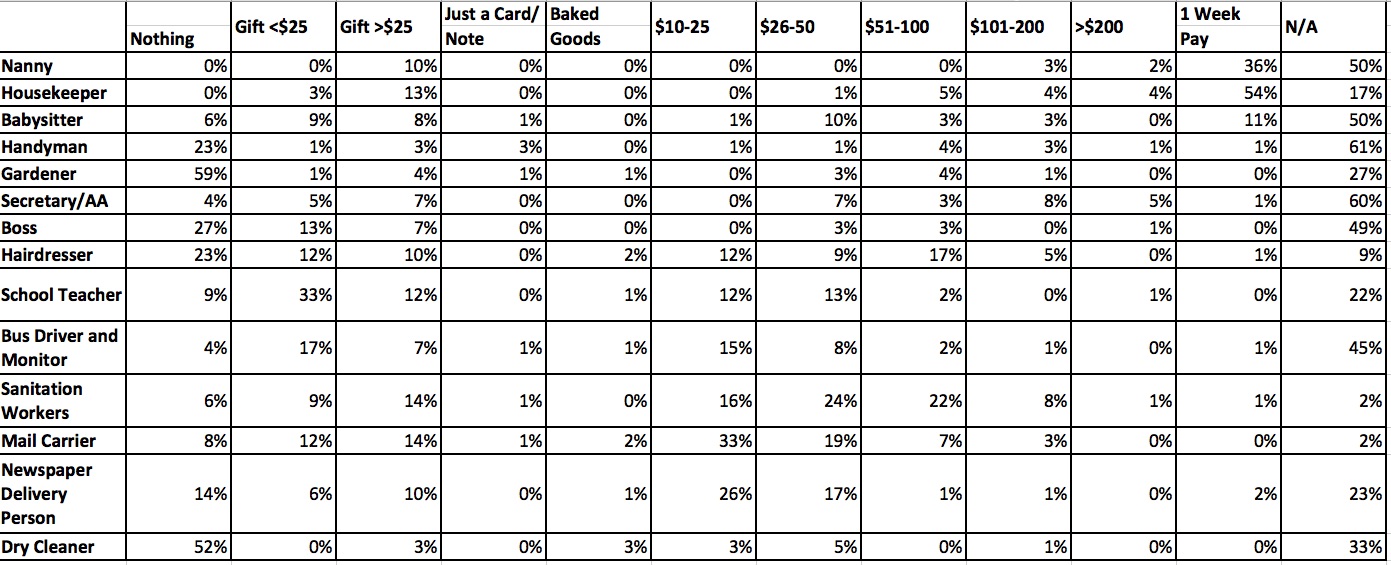The 2015 Guide to Holiday Tipping and Gifting
- Monday, 14 December 2015 15:23
- Last Updated: Wednesday, 16 December 2015 16:13
- Published: Monday, 14 December 2015 15:23
- Stacie M. Waldman
- Hits: 14340
 Thanks to the tremendous response we received on our holiday tipping survey, we are pleased to present you with the results. How much do people in town tip for the holidays? To whom do people give tips, gifts or a simple note of gratitude? There is no right or wrong answer, although policies do exist for some employees regarding what they are allowed to accept.
Thanks to the tremendous response we received on our holiday tipping survey, we are pleased to present you with the results. How much do people in town tip for the holidays? To whom do people give tips, gifts or a simple note of gratitude? There is no right or wrong answer, although policies do exist for some employees regarding what they are allowed to accept.
Holiday time gives you a chance to say thank you to those who impact your life in a positive way, help you or provide a service to you on a regular basis. Gifting and tipping is often done out of obligation, but one should not feel obligated to give. If gift giving is not within your budget, a note expressing your gratitude should be enough. And if it is within your budget, give some thought to whom you are tipping and why you are tipping them. As one woman said during last year's tipping survey, "Sometimes the people who least expect a gift are the ones who appreciate it the most. The front desk clerk at my child's school cried when I gave her a $10 gift card to Starbucks." Another person commented on the fact that she gave a monetary gift to a regular cashier she sees at the market; she expressed such true gratitude for gift.
The Emily Post etiquette website advises, "Do not buy into the thought that if you don't tip you won't get good service for the coming year. If you think you've had bad service for this reason, you might want to...speak directly to a manager. The site also adds: "Tipping is one of the most stressful and confusing aspects of etiquette today. It is a...way to show appreciation for a job well done; however, treating the person who has served you with respect is every bit as important."

Analysis
The Nanny: Most people give their nannies a week pay as a holiday bonus, if not more (72%). Several people mentioned in their comments that they give their nannies two extra weeks of pay. A working mom of three said, "My nanny makes my life so much easier for us and makes it possible for us to maintain our careers, so we give her a very generous 2.5 week bonus."
The Housekeeper: The majority of people have housekeepers (83%) and gift their housekeepers a week's pay as a holiday gift. Of those who have a housekeeper, an additional 16% give a gift valued over $25. "My housekeeper is reliable and works hard for us," said a Fox Meadow resident, "so I like to show my gratitude with an extra week of pay so she can afford to get her kids or herself a little something extra around the holidays. I usually include a gift just for her like perfume."
The Sitter: Half of those who responded to the survey have babysitters and usually give one week of pay to their sitters. Another 25% give between $26-$50. Some give a gift and it was split almost evenly between those who spent under $25 and those who spent over $25. You may want to consider how often you use your babysitter to determine how you'd like to acknowledge them.
The Boss: Half of respondents had no boss, but for those who do, more than half do nothing for them. However, 25% will get their boss a gift valued under $25.
The Hairdresser: Most people (91%) have a hairdresser. Of those, 25% give nothing and 25% give cash or a gift under $25; 10% give between $25-50, 20% give between $51-100, and 5% give between $100-200. If you go during the holidays to get your hair done and it is your regular hairdresser, it is appropriate to give a bigger tip than usual (and up to the cost of the hair treatment).
The Teacher: School teachers often receive small gifts during the holidays. Of the respondents, 22% do not have children in school. Of the 78% that do, 12% give nothing and 40% give a gift valued under $25. Another 15% of those people who have kids in school give teachers a gift valued over $25, a monetary gift between $10-25, or a monetary gift of $26-50. Interestingly, two people gave teachers a cash gift of between $51-100 and one person gave over $200 to teachers. Although it is possible that these parents have children in private school with different policies, Scarsdale school policy states that class parents can ask for contributions of up to $10 per family for a group gift for the teacher and individual gifts must remain under $15.
The Bus Driver/Monitor: Just over half of respondents have a bus driver and monitor for their kids and most people give a small gift or cash valued under $25.
The Trash Guys: Scarsdale's Department of Sanitation informed me that written policy states that sanitation workers cannot accept or solicit monetary gifts. Despite the policy, 94% of those polled give money to their sanitation workers. One mom told me that she chooses not to tip sanitation workers because they are salaried employees with benefits and are not dependent on tips. "They're not people who I have a relationship with and who provide me with a special service, so I don't feel the need to give them money beyond what I pay through my taxes. On the other hand, I give holiday gifts to the people who help me out on a regular basis and never get acknowledged like my pediatrician who calls me back in less than ten minutes solving minor problems and saving me countless trips to the office." Almost 10% of people give gifts valued under $25 and 14% give gifts valued over $25. Of those that give cash, 16% give between $10-25, 24% give between $26-50, 22% give between $51-100, and 8% give between between $101-200. One person gives over $200 and another gives the equivalent of a week's pay. We certainly love and appreciate our sanitation workers! If you're going to give the sanitation workers a gift, some people recommend taping a note onto the garbage cans on trash day requesting they ring the doorbell to hand them their acknowledgement directly, ensuring the right people receive the gift. One mom posted on the Scarsdale Moms Facebook page that she went out of her way to drop cash off at the sanitation office for the people who haul her trash and they never got it. This might be due to the village policy.
The Postman: Mail carriers are also usually acknowledged during holiday time, although the United States Postal Service (USPS) does not allow mail carriers to accept cash gifts, checks, or any other form of currency. They may accept snacks and beverages, gifts valued under $20 including gift cards to a specific retailer, or gift baskets that can be shared with other staff. That being said, only 12% of respondents give a gift valued under $25. More commonly, people give cash: 33% give between $10-25, $19% give between $26-50, 7% give between $51-$200, and three people actually give between $101-$200. Has anyone ever received a note from their mail carrier saying, "My apologies, USPS policy states I cannot accept cash..."? I bet not. My own mail carrier leaves me an envelope saying "happy holidays" on it with his address. In previous years it was even stamped. I personally find that to a be a bit aggressive considering the postal service's policy.
The Delivery People (Newspaper, FedEx, UPS): Newspaper deliverers commonly receive cash, between $10-25. Private delivery people (FedEx and UPS) may accept monetary and non-monetary gifts.
The Dry Cleaner: More than half of respondents don't give anything to their dry cleaner attendant. Those that do might give a small gift, gift card, or some extra cash with a pick-up.
The Gardener: Two-thirds of us don't go out of their way to give anything to the gardener. Those that do most often give a gift valued over $25 or cash ($51-100).
The Admin: A third of respondents have secretaries/administrative assistants. People really vary with what they give and 10% give nothing. Some give over $200, some give less than $25, and there are lots of people who gave something in the middle or a gift versus cash. Most people give something but the results were over the place. Sorry folks, there's really no average here or suggested gift value.
The Handyman: Handymen were the most likely to receive a simple note or card saying "thanks." Of the 40% of people who have a regular handyman, more than half do nothing. Another handful of people give a gift valued >$25, cash $51-100, or cash $101-200. Again, if your handyman is working around the holidays for you or really goes out of his way for you, it is generous to show your appreciation in some way.
Not included in the table above are day care providers as only 17% of respondents use this service. Mostly people gave a small gift or cash valued under $50. Dog walkers were seldom used (15% of respondents have dog walkers) but those who do give a small gift or a week's pay. About 23% of people have a valet and most give some small acknowledgement of thanks such as a note, small gift, or between $10-$50. Personal trainers commonly receive cash gifts of $51-100, but some people will give a full week's pay. Doctors were the least likely to receive any sort of holiday gift from their patients. Of the 74 respondents to this question, 6 give a small gift, 2 write notes, and a few give gifts valued between $25-$100.
Several people commented that they give gifts to categories of people not included on this year's survey: their children's extracurricular teachers (music, dance, voice), coaches, tutors, groomers, milkmen, nail salon attendants, vets, gym instructors, and tennis professionals.
One person avoids "tipping" at all during holiday time and instead makes monetary donations to a charity in honor of the person for whom they are grateful.
Remember, there is no "right amount," to give; these survey results simply provide a guideline for what people in our community typically give and to whom they give during the holidays.






